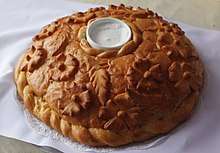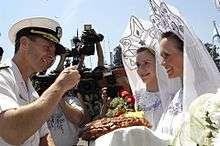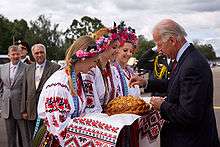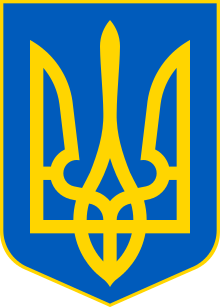Bread and salt

Bread and salt is a welcome greeting ceremony in several Slavic and other European cultures and in Middle Eastern cultures. The tradition, known by local Slavic names: Belarusian: Хлеб і соль; Bulgarian: Хляб и сол; Macedonian: Леб и сол; Croatian: Kruh i sol; Serbian: Хлеб и со; Polish: Chleb i Sól; Slovak: Chlieb a soľ; Czech: Chléb a sůl; Slovene: Kruh in sol; Russian: Хлеб-соль, Ukrainian: Хліб і сіль was also adopted by three non-Slavic nations — Lithuanians, Latvians (both Baltic) and Romanians (Latin) — all three of which are culturally and historically close to their Slavic neighbours (Lithuanian: Duona ir druska. Latvian: Sālsmaize and Romanian: Pâine și sare). It is also common in Albania (Albanian: bukë, kripë e zemër), Armenia (Armenian: աղ ու հաց, agh u hats), the Jewish diaspora, and the Middle East. This tradition has also been observed in spaceflight.[1][2]
Cultural associations

Albania
Bread, salt and heart (Albanian: bukë, kripë e zemër) is a traditional Albanian way of honoring guests, it dates back from the Kanun of Lekë Dukagjini Chapter 18 - para.608: "The Guest shall be welcomed with Bread, salt and heart". Heart in the context is related with hospitality, the concept is based on giving the most expensive thing of that time which was salt to the awaited guest. Nowadays it is not commonly practiced during daily life.
Belarus, Russia and Ukraine

When important, respected, or admired guests arrive, they are presented with a loaf of bread (usually a korovai) placed on a rushnyk (embroidered ritual cloth). A salt holder or a salt cellar is placed on top of the bread loaf or secured in a hole on the top of the loaf. On official occasions, the "bread and salt" is usually presented by young women dressed in national costumes (e.g., sarafan and kokoshnik).
The tradition gave rise to the Russian word that expresses a person's hospitality: "khlebosolny" (literally: "bready-salty"). In general, the word "bread" is associated in Russian culture with hospitality, bread being the most respected food, whereas salt is associated with long friendship, as expressed in a Russian saying "to eat a pood of salt (together with someone)". Also historically the Russian Empire had a high salt tax that made salt a very expensive and prized commodity (see also the Moscow uprising of 1648).

There also is a traditional Russian greeting "Khleb da sol!" (Хлеб да соль! "Bread and salt!"). The phrase is to be uttered by an arriving guest as an expression of good wish towards the host's household. It was often used by beggars as an implicit hint to be fed, therefore a mocking rhymed response is known: "Khleb da sol!" — "Yem da svoy!" (Хлеб да соль — ем да свой! "Bread and salt!" — "I am eating and it is my own!").

In the Russian Orthodox Church, it is customary to greet the bishop at the steps of the church when he arrives for a pastoral visit to a church or monastery with bread and salt.
Bulgaria
Bread and salt (Bulgarian: хляб и сол, transliterated hlyab i sol) is a traditional Bulgarian custom expressing hospitality, showing that the guest is welcomed. The bread and salt is commonly presented to guests by a woman. Bulgarians usually make a certain type of bread for this occasion called pogacha, which is flat, fancy, and decorated. Regular bread is not usually used, although it may have been historically, but pogacha is much more common in this custom.
Usually, guests are presented with the pogacha, and the guest is supposed to take a small piece, dip into the salt and eat it. This custom is common for official visits regardless of whether the guest is foreign or Bulgarian. One notable example of this custom is when the Russians came to liberate Bulgaria from the Ottomans at the end of the 19th century. A common scene from that period was of a Bulgarian village woman welcoming Russian soldiers with bread and salt as a sign of gratitude.
Czech Republic and Slovakia
This tradition is still practiced in the Czech Republic (chléb a sůl) and Slovakia (chlieb a soľ) for special occasions, for example, when presidents from other countries are visiting. It is not commonly practiced during daily life.
Poland
In Poland, welcoming with bread and salt ("chlebem i solą") is often associated with the traditional hospitality ("staropolska gościnność") of the Polish nobility (szlachta), who prided themselves on their hospitality. A 17th-century Polish poet, Wespazjan Kochowski, wrote in 1674: "O good bread, when it is given to guests with salt and good will!" Another poet who mentioned the custom was Wacław Potocki.[3] The custom was, however, not limited to the nobility, as Polish people of all classes observed this tradition, reflected in old Polish proverbs.[4] Nowadays, the tradition is mainly observed on wedding days, when newlyweds are greeted with bread and salt by their parents on returning from the church wedding.
Republic of Macedonia
In the Republic of Macedonia, this tradition still is practiced occasionally as a custom expressing hospitality. A certain type of bread, similar to that in Bulgaria and also by the same name — pogača (from Latin panis focacius) is prepared.
The famous Macedonian and ex-Yugoslav ethno-jazz-rock group of even more famous world music guitarist, Vlatko Stefanovski, had the name "Leb i Sol", which means "bread and salt" and speaks itself about this term of hospitality as something basic and traditional.
Romania
As in Slavic countries, bread and salt is a traditional Romanian custom expressing hospitality, showing that the guest is welcomed.
Serbia
Bread and salt (hleb i so) is a traditional welcoming of guests,[5] being customary to offer it before anything else,[6] with bread having an important place in Serbian tradition, used in rituals.[7][8] The traditional bread, pogača, is a symbol of family unity and goodness, and salt prosperity and security for the guest. It is part of the state protocol, in use since the Principality of Serbia, often used when welcoming foreign representatives.[9]
Finland, Estonia, Latvia and Lithuania
In Finland, Estonia, Latvia and Lithuania, bread and salt were traditionally given as a symbol of blessing for a new home. Instead of white bread, dark fiber-rich rye bread was used.
Germany
Bread and salt are given away for different reasons:
- to the wedding for a lasting alliance between spouses
- to move into a house to wish sedentary, prosperity and fertility.
In northern Germany and Bohemia (Czech Republic) bread and salt are traditionally put into the diaper of a newborn. In Transylvania bread and salt are served to protect against weather demons.
Arab culture
Arab culture also have a concept of "bread and salt" (خبز وملح or عيش وملح) but not in the context of welcoming, but as an expression of alliance by eating together, symbolizing the rapprochement between two persons. Eating bread and salt with a friend is considered to create a moral obligation which requires gratitude. This attitude is also expressed by Arab phrases such as "there are bread and salt between us" (بيننا خبز وملح or بيننا عيش وملح), and "salt between them" (بينهما ملح) which are terms of alliance.
Jewish culture
The practice exists also among Jews in the Diaspora and in Israel. The ceremony of Kiddush includes dipping a piece of Challah in salt. Bread and salt are also used in welcoming ceremonies and given to the welcomed persons. It is common in Israel for a landlord or real estate agent to leave bread and salt in the home to welcome new tenants, as these should be the first things brought into a new home.
It is an important part of the culture. It is given on all good occasions: during weddings, house warming parties, and childbirth.
Iranian culture
In the Iranian culture when a guest is welcomed into the home, it's said that they have eaten Bread and salt, and this leads to loyalty of the guest.[10]
United Kingdom
In Northern England and Scotland the tradition is observed on New Year's Day, where the first individual to enter a house may be required by tradition to bring bread, salt and coal.
In Space
With the advent of the Soviet space program, this tradition has spread into space, where appropriately small packages of bread and salt are used nowadays.[1][2] It was observed at the Apollo–Soyuz Test Project and the Salyut programme, when crackers and salt tablets were used in the spaceship. Bread chunks and salt were a welcome at the Mir space station,[1][2] a tradition that was extended on the International Space Station.[2][11] Bread and salt are also a welcome for cosmonauts returning to Earth.[12]
In fiction
The custom of serving bread and salt to guests is a recurring reference in George R. R. Martin's A Song of Ice and Fire novels, where the welcome ritual serves as not only as a Westerosi tradition of hospitality but also a formal assurance of "guest right", a sacred bond of trust and honor guaranteeing that nobody in attendance, hosts and guests alike, shall be harmed. Violating the guest right is widely considered among the highest moral crimes, an affront worthy of the worst damnation, rivaled only by kinslaying. Game of Thrones, the associated television series, prominently features the tradition in season three, episode 9, "The Rains of Castamere." Rival noble houses Stark and Frey are meeting to discuss a marriage alliance. The Starks fear betrayal by the Freys, but their worries are assuaged when the most important members of each house eat bread and salt from the same platter, establishing guest right.
In Season 2, Episode 4 of Peaky Blinders, Alfie Solomons offers Charles Sabini bread and salt as Sabini offers a white flag of truce.
Rudyard Kipling referenced bread and salt in a number of works. In The Ballad of East and West, leavened bread and salt is mentioned as binding an oath of blood brothership. At the beginning of Puck of Pook's Hill Puck establishes his credentials with the child protagonists by asking them to sprinkle plenty of salt on their shared meal. ""That'll show you the sort of person I am."
In Rosemary Sutcliff's historical novel Outcast, bread and salt is referred to as a sign of belonging to a tribe: "You are my people, my own people, by hearth fire and bread and salt".
In the Count of Monte Cristo by Alexandre Dumas, Chapter 72 is titled "Bread and Salt." The character Mercedes attempts to coax the main character into eating fruit, as part of an Arabian custom to ensure that those who have shared food and drink together under one roof would be eternal friends.
In D.R. Merrill's 2014 science fiction novel Lamikorda the Alplai greet the leaders of the Terran colony vessel with a ritual meal of foods representing their major cultures, including bread from the Saakh; one of the Terrans then presents a small container of sea salt, which is graciously accepted and added as a symbol of their friendship.
Bread and salt are given as a housewarming gift in one scene of the 1946 film It's A Wonderful Life.
References
| Wikimedia Commons has media related to Bread and salt. |
- 1 2 3 Dunn, Marcia (March 17, 1995). "The Daily Courier (Yavapai, AZ)". news.google.com.
- ↑ "Wacław Potocki - 'Chlebem, czapką, solą'" (in Polish). republika.pl. Archived from the original on March 4, 2008. Retrieved 2015-06-13.
- ↑ "'Chlebem i solą. Dawne uczty polskie' - Wydarzenie" (in Polish). culture.pl. Archived from the original on 2013-05-17. Retrieved 2015-06-13.
- ↑ Ken Albala (2011). Food Cultures of the World Encyclopedia. ABC-CLIO. pp. 3–. ISBN 978-0-313-37626-9.
- ↑ Dragoljub Zamurović; Ilja Slani; Madge Phillips-Tomašević (2002). Serbia: life and customs. ULUPUDS. p. 30.
- ↑ Timothy L. Gall; Jeneen Hobby (2009). Worldmark Encyclopedia of Cultures and Daily Life: Europe. Gale. p. 448. ISBN 978-1-4144-6430-5.
- ↑ "Hleb u narodnoj magiji Balkanskih Slovena". Rastko.
- ↑ "Pogača i so kroz vekove čuvaju goste".
- ↑ "نان و نمک". Dehkhoda Dictionary. Retrieved 26 August 2015.
- ↑ "Feast of bread and salt awaits space station crew - World". Smh.com.au. 2003-02-01. Retrieved 2015-07-22.
- ↑
Bibliography
- R. E. F. Smith, David Christian, Bread and Salt: A Social and Economic History of Food and Drink in Russia (1984) ISBN 0-521-25812-X
